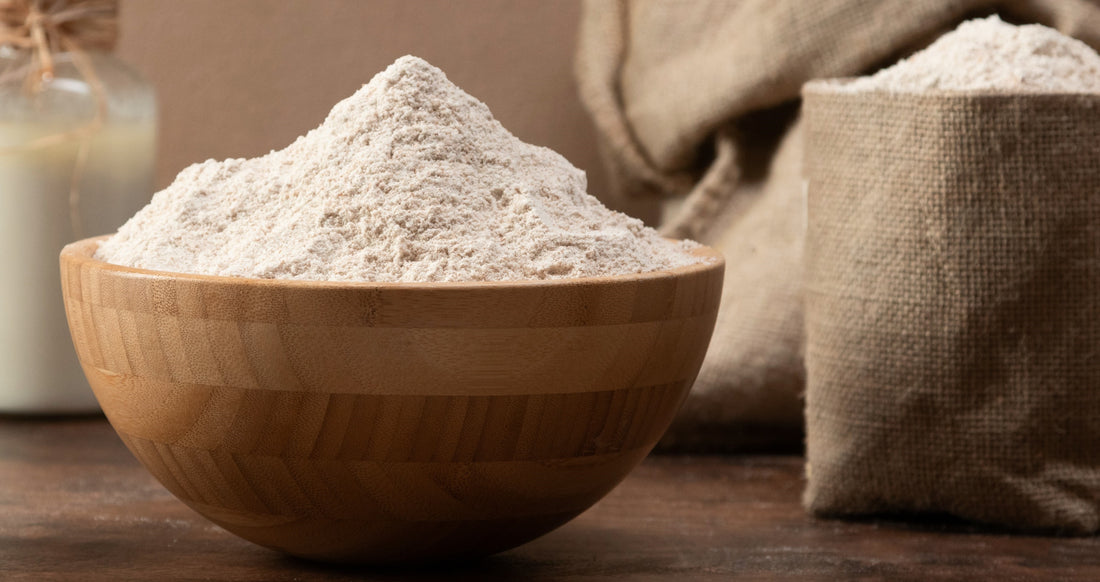Embarking on a Keto journey in itself can be quite daunting, add to that the necessity of adhering to a gluten-free diet, the task of nourishing your body can seem even more formidable. Keto diet excludes carbohydrates, that eliminates a lot of regularly consumed foods from the diet such as bread, noodles, pasta, crackers, cereals, and rice and since most of these use flours as the base ingredient, the question arises "What is Keto Flour". Well we've got you covered as we guide you through the intricacies of the Keto Diet, unravel the mysteries of gluten, and explore the versatile use of gluten-free keto flour.
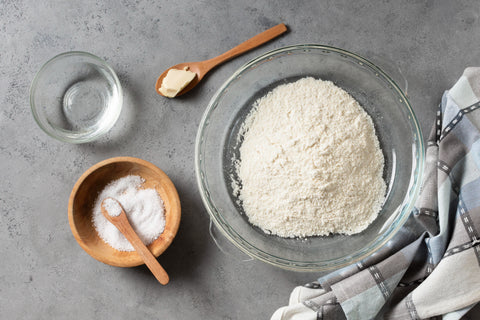
Understanding the Keto Diet
The ketogenic diet, or keto diet, is a high-fat, low-carbohydrate eating plan that has gained popularity for its potential to promote weight loss and improve health. By drastically reducing carbohydrate intake and increasing consumption of fats and protein, the body enters a metabolic state called ketosis. During ketosis, the body shifts from using glucose as its primary source of energy to burning fat for fuel. This metabolic switch can lead to rapid weight loss and other health benefits.
When following a keto diet, individuals typically aim to keep their daily carbohydrate intake below 50 grams, although this may vary depending on factors such as age, gender, activity level, and health goals. The emphasis is on quality sources of protein and fats.
For Vegans, finding adequate sources of protein while adhering to a keto and gluten-free lifestyle can pose a challenge. However, several plant-based options can fulfil their protein needs. One standout choice is quinoa, renowned for being a complete protein as it contains all nine essential amino acids. Beyond quinoa, vegans can incorporate a variety of nuts, seeds, avocados, and healthy oils like olive oil and coconut oil to meet their fat and protein requirements. These plant-based sources not only provide essential nutrients but also contribute to the overall flavour and texture of vegan keto-friendly and gluten-free meals.
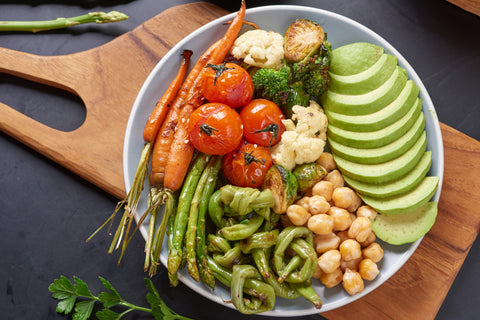
Transitioning into ketosis may cause short-term side effects, commonly referred to as the "keto flu." Symptoms may include fatigue, headache, nausea, and irritability, but these usually subside within a few days to weeks as the body adjusts to using fat for fuel. It's important to stay hydrated and replenish electrolytes during this transition period to alleviate symptoms.
While the keto diet can be effective for weight loss and improving metabolic health, a general concern is “Can Keto cause vitamin deficiency?” since key nutrients such as B vitamins, calcium, iron, and magnesium may be lacking. To ensure adequate intake of these nutrients, it's important to include a variety of nutrient-dense foods such as leafy greens, cruciferous vegetables, nuts, seeds, legumes, and whole grains, all of which provide essential vitamins, minerals, and antioxidants. Additionally, fortified plant-based milk alternatives and nutritional yeast can be valuable sources of nutrients like calcium, vitamin D, and B vitamins. For people with specific dietary needs or medical conditions, supplementation may be necessary to address potential nutrient deficiencies.
What is Gluten?
Gluten is a protein found in grains such as wheat, barley, and rye. While gluten itself does not provide any essential nutrients, it plays a crucial role in the texture and structure of many foods. However, for individuals with celiac disease, an autoimmune condition triggered by gluten consumption, the ingestion of gluten can lead to inflammation and damage to the lining of the small intestine. This can result in symptoms such as abdominal pain, bloating, diarrhoea, fatigue, and nutrient malabsorption.

Due to the potential health concerns linked to gluten, many individuals opt for a gluten-free lifestyle to alleviate symptoms and enhance their overall well-being. This dietary approach entails abstaining from foods and ingredients containing gluten, such as bread, pasta, cereals, baked goods, and processed foods. Instead, those following a gluten-free regimen concentrate on naturally gluten-free foods which include fruits, vegetables, legumes, nuts, seeds, and gluten-free grains like red rice, quinoa, and buckwheat. Additionally, these foods are also diabetic-friendly since they have a low glycemic index.
Navigating Keto Flours
Baking on a keto diet requires special consideration when it comes to selecting the right flour. Traditional wheat flour is high in carbohydrates, making it unsuitable for keto baking. Fortunately, there are several keto-friendly flours available that can be used as alternatives:
Almond flour: Made from ground almonds, almond flour is a popular keto flour for baking due to its low carbohydrate content which means it is gluten free and high-fat content. It provides a nutty flavour and moist texture to baked goods and can be used in a variety of recipes, including cakes, cookies, muffins, and bread. Explore this delightful Almond flour cookie recipe by Sattvic Foods.
Coconut flour: Made from dried coconut meat, coconut flour is another keto-friendly option that is low in carbohydrates, gluten-free and high in fibre. It has a light texture and mild coconut flavour, making it suitable for cakes, cookies, pancakes, and bread.
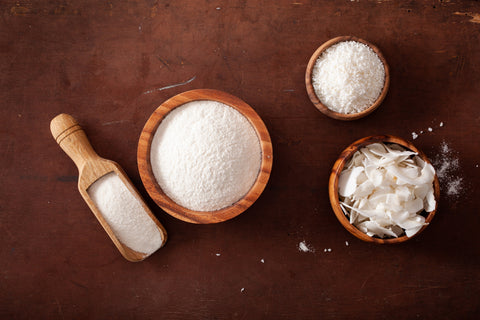
Psyllium husk powder: Derived from the husks of psyllium seeds, psyllium husk powder is a soluble fibre that can be used as a binding agent and thickener in keto baking. It helps to improve the texture and structure of baked goods and can be used in combination with other keto-friendly flour like almond flour and coconut flour.
Flaxseed meal: Ground flaxseeds, or flaxseed meal, are rich in fibre and healthy fats, making them an excellent choice for keto baking. Flaxseed meal can be used to add moisture and texture to recipes like bread, muffins, and pancakes, as well as to provide a nutty flavour and crunchy texture to crusts and coatings.
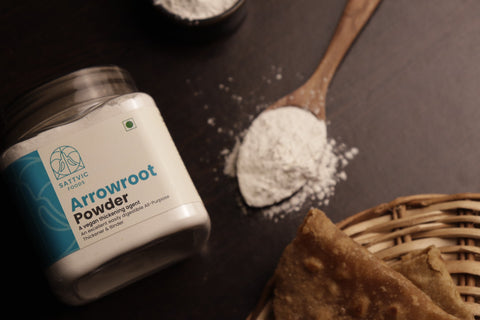
To enhance the binding properties of keto-friendly flours and achieve better results in baking, consider incorporating gluten replacements such as xanthan gum or arrowroot powder. These ingredients help to mimic the texture and structure of gluten-containing baked goods, ensuring successful outcomes without compromising the keto-friendly and gluten-free nature of your creations.
When using keto-friendly flour in recipes, it's important to note that it may behave differently than traditional wheat flour due to its unique properties. For example, almond flour and coconut flour are denser and more absorbent than wheat flour, so recipes may require adjustments to the liquid and leavening agents to achieve the desired texture and consistency. Additionally, keto-friendly flours may impart a distinct flavour to baked goods, so it's important to experiment with different combinations and ratios to find the best results.
Gluten-Free and Keto-Friendly Foods
Low-carb vegetables: opt for non-starchy vegetables such as leafy greens (spinach, kale, arugula), cruciferous vegetables (broccoli, cauliflower, Brussels sprouts), and other low-carb options like zucchini, bell peppers, cucumber, and asparagus. These vegetables are rich in essential nutrients and fibre, making them ideal choices.
Healthy fats: Include sources of healthy fats in your diet, such as avocados, olive oil, coconut oil, nuts, seeds, and plant-based sources of omega-3 fatty acids like chia seeds, flaxseeds, and hemp seeds. These fats provide sustained energy and promote satiety, helping you feel full and satisfied.

Protein-rich foods: Incorporate plant-based protein sources into your meals, such as Quinoa (a complete protein), tofu, tempeh, seitan, legumes (lentils, chickpeas, black beans in moderation), and edamame. Protein is essential for muscle repair and growth, as well as supporting overall health and metabolism.
Nuts and seeds: Snack on nuts and seeds for a satisfying crunch and nutritional boost. Almonds, walnuts, pecans, macadamia nuts, chia seeds, flaxseeds, sunflower seeds and pumpkin seeds are all excellent choices for vegan gluten-free keto-friendly snacks.
You can find a range of these keto-friendly and gluten-free ingredients at Sattvic Foods. Shop now!

